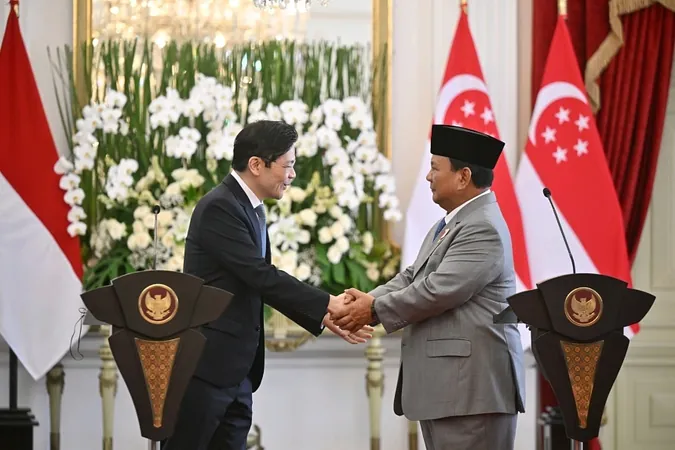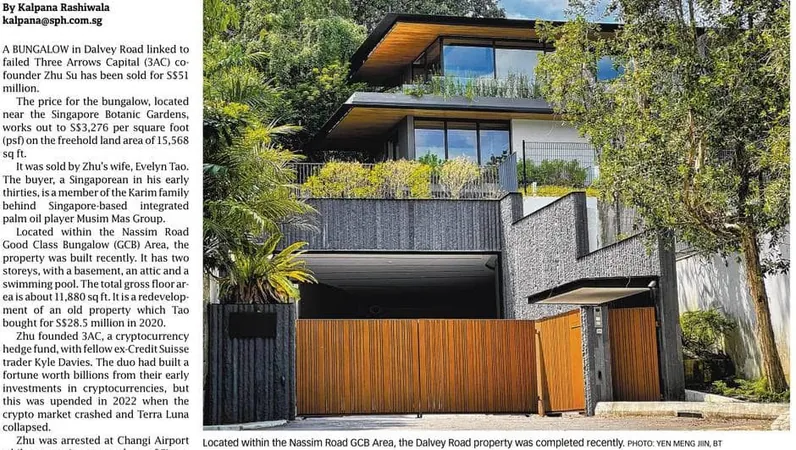
New Era for Singapore-Indonesia Relations: PM Wong Highlights Opportunities After Meeting with President Prabowo
2024-11-06
Author: Wei Ling
JAKARTA – A groundbreaking chapter in Singapore and Indonesia's bilateral relations is on the horizon, underscored by collaboration in diverse sectors, as highlighted by Singapore Prime Minister Lawrence Wong during his official visit on November 6.
Joint Press Conference Highlights
In a joint press conference at the presidential palace in Jakarta, PM Wong and Indonesian President Prabowo Subianto expressed their commitment to advancing the partnership that has flourished over the years. As new leaders, PM Wong, who became Prime Minister on May 15, and President Prabowo, inaugurated on October 20, acknowledged the strong foundation laid by their predecessors.
“This is a pivotal moment for us to enhance our bilateral ties to unprecedented levels,” PM Wong asserted, reflecting on the opportunities that lie ahead for both nations.
Significance of the Visit
The significance of PM Wong's visit cannot be overstated; it's the first official visit by any foreign leader following President Prabowo's inauguration. He emphasized the strong cooperative framework established between Singapore and Indonesia, stating, “Singapore is not just a neighbor but a critical partner that offers invaluable collaboration both bilaterally and through ASEAN.”
Key Areas of Discussion
During this visit, which marks their fourth meeting in 2024, leaders discussed vital areas such as defense, digital technologies, healthcare, and trade. Notably, bilateral trade reached a substantial US$69 billion in 2023, alongside Singapore's foreign direct investment of US$15.4 billion into Indonesia.
Tourism also plays a significant role in their relationship; in 2023 alone, Singapore welcomed 2.3 million Indonesian tourists, while 1.4 million Singaporeans visited Indonesia. These figures illustrate the deep-rooted preferences for travel between the two nations.
Collaboration on Food and Energy Security
Key discussions highlighted potential collaborative efforts focused on food security—a pressing concern for Indonesia. PM Wong expressed readiness to assist Indonesia in enhancing agricultural productivity using technology and best practices, crucial for addressing regional food challenges.
“It’s essential we work together to ensure food standards and bolster Indonesia’s food security,” PM Wong stated.
Additionally, energy security emerged as a major theme, as both leaders explored opportunities for clean energy projects and sustainable practices that promise to become a new growth engine for both countries.
Regional Geopolitics and Future Collaboration
Regional geopolitics was also a matter of concern, with Mr. Prabowo expressing alarm over the ongoing violence in the Middle East and emphasizing the need for immediate negotiations for peace, humanitarian aid, and a viable two-state solution.
Myanmar's political climate was another topic, with both leaders advocating for the implementation of ASEAN's peace plans in response to the unrest following the military coup in 2021.
As the world faces increasingly complex geopolitical tensions, PM Wong remarked, “We share mutual beliefs of promoting peace and stability, seeking amicable relations with all, including major powers like the U.S. and China.”
Openness to BRICS and Multilateralism
In a discussion about Indonesia's prospects of joining BRICS as a partner nation, PM Wong highlighted Singapore's open-mindedness towards such alliances, emphasizing that national interests and strengthening multilateralism remain paramount.
Ceremonial Engagement and Leaders' Retreat
During his visit, PM Wong also engaged with several key Indonesian officials and participated in a ceremonial wreath-laying at Kalibata Heroes Cemetery, a significant gesture of respect for Indonesia's history.
Looking Ahead
Looking ahead, both leaders are enthusiastic about the next Singapore-Indonesia Leaders’ Retreat slated for 2025 in Singapore—an event poised to further solidify their countries' collaborative future.
With a mixture of potential and commitment, both nations are set to thrive in a cooperative framework that promises to yield fruitful benefits for their citizens and the broader Southeast Asian region.




 Brasil (PT)
Brasil (PT)
 Canada (EN)
Canada (EN)
 Chile (ES)
Chile (ES)
 España (ES)
España (ES)
 France (FR)
France (FR)
 Hong Kong (EN)
Hong Kong (EN)
 Italia (IT)
Italia (IT)
 日本 (JA)
日本 (JA)
 Magyarország (HU)
Magyarország (HU)
 Norge (NO)
Norge (NO)
 Polska (PL)
Polska (PL)
 Schweiz (DE)
Schweiz (DE)
 Singapore (EN)
Singapore (EN)
 Sverige (SV)
Sverige (SV)
 Suomi (FI)
Suomi (FI)
 Türkiye (TR)
Türkiye (TR)